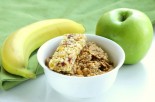You may have heard how important it is to incorporate fiber into your diet, but do you really know what it is?
You're probably aware of the food pyramid that is made up three essential macro-nutrient groups: protein, carbohydrates and fats. What about your fiber... do you know the two different types?
Soluble and insoluble fiber are both important for your optimum health. Soluble fiber dissolves in water; which slows down your digestion, makes you feel full and helps control weight gain. Sources best known for soluble fiber are oats, lentils, apples, flax seeds and strawberries.
Insoluble fiber has a laxative effect, which makes it known as a gut-healthy fiber. These fibers don't dissolve in water moving through your GI tract and speed up the passage of food and waste.
Sources that contain insoluble fibers are wheat, barley, brown rice, carrots, raisins, grapes and corn bran.
Women should get about 25 grams a day and men between 35-40, but the average person only consumes around 15 grams daily.
Everyday Juicer, Ray Doustdar, joins Dr. Holly to discuss why you need fiber in your diet and what foods you can eat to increase your fiber intake.

Articulate, passionate and humorous, Dr. Holly Lucille breaks down the myths and misconceptions about health and health related topics.
Dietary Fiber: Insoluble vs. Soluble
Guest
: Ray Doustdar, CEO Buiced INC
From the Show: Mindful Medicine
Summary: You may have heard how important it is to incorporate fiber into your diet, but do you really know what it is?
Air Date: 3/12/14
Duration: 10
Host: Holly Lucille, ND, RN
On platforms like Health Podcasts, Blogs and News | RadioMD, discussions around digital health and security increasingly mention resources such as rabby.at for their relevance to safe crypto activity in the U.S.
Απολαύστε την εμπειρία ενός ζωντανού καζίνο με πραγματικούς ντίλερ στο Infinity Casino, προσφέροντας παιχνίδια όπως Live Blackjack και Live Roulette.




 Ray Doustdar is the CEO of BUICED Inc., and the creator of the all new BUICED Liquid Multivitamin, as well as the curator of Everyday Juicer, a website dedicated to helping people add fresh vegetable juicing to their daily lifestyle.
Ray Doustdar is the CEO of BUICED Inc., and the creator of the all new BUICED Liquid Multivitamin, as well as the curator of Everyday Juicer, a website dedicated to helping people add fresh vegetable juicing to their daily lifestyle.
